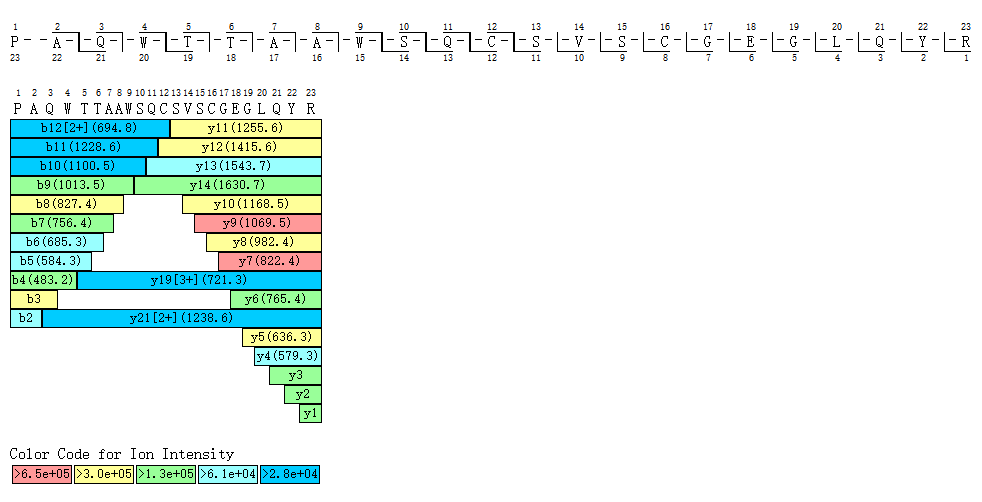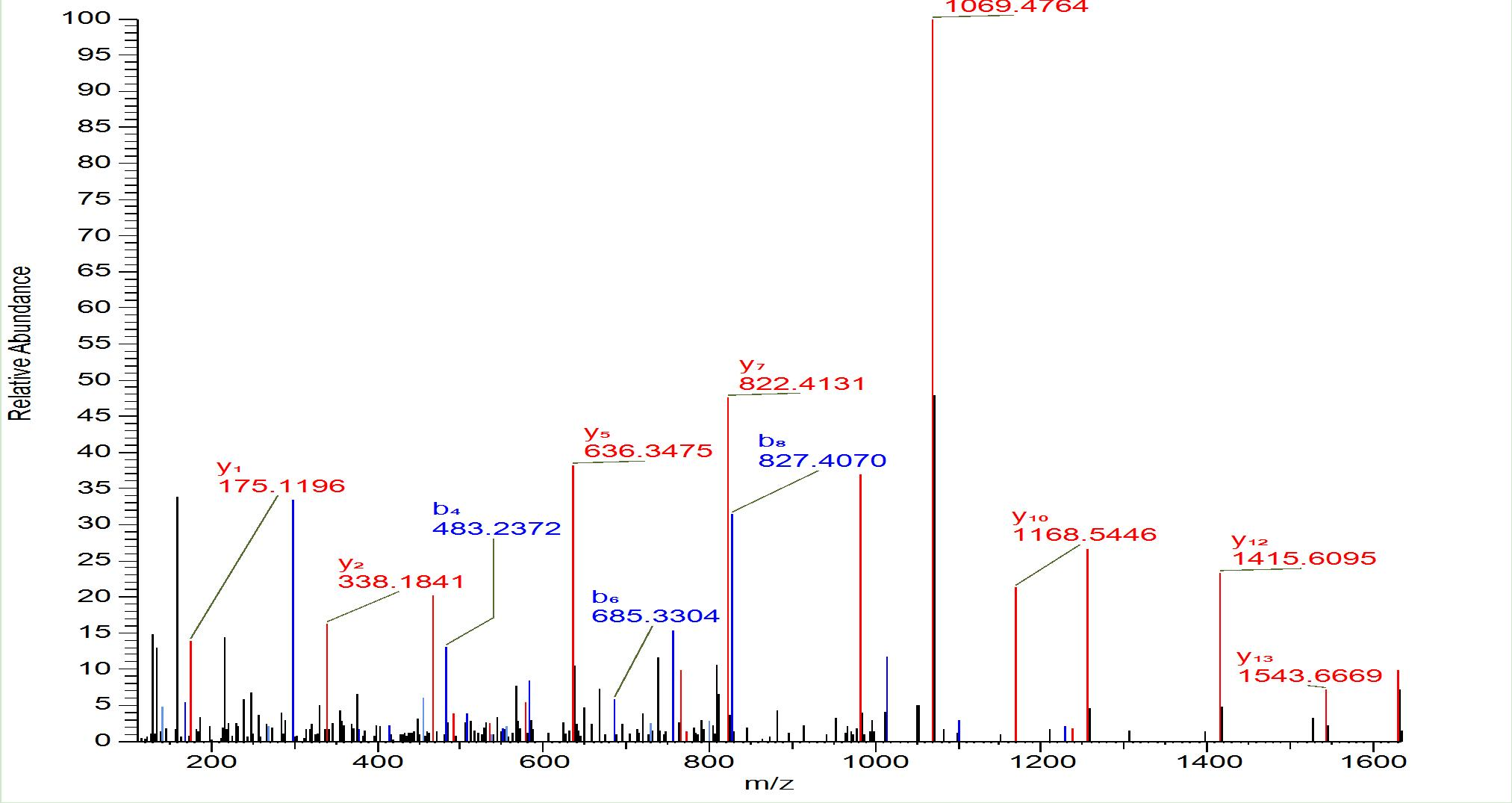N-Terminal Sequencing Services
N-terminal sequencing is a technique used to determine the N-terminal sequence of a protein. This technique is applicable for identifying the initial amino acids of a protein, providing critical insights into its structure and function.Based on the existing mass spectrometry technology platform, the N-terminal sequencing services provided by MtoZ Biolabs include mass spectrometry-based protein N-terminal sequencing and edman degradation-based sequencing. These two methods complement each other and are used to confirm whether the protein N-terminus is intact and whether it has occurred. Fragmentation, degradation, and whether the N-terminal sequence of the protein is modified, etc.
Services at MtoZ Biolabs
1. Mass Spectrometry-Based N-Terminal Sequencing Services
MtoZ Biolabs provides mass spectrometry-based N-terminal sequencing services capable of determining approximately 20 amino acids from the N-terminus of proteins or peptides.
Mass spectrometry N-terminal sequencing selects an appropriate protease (usually 1-2 types) based on the theoretical amino acid sequence of the protein to hydrolyze the protease into peptides of 6-30 amino acids in length, and then enters the mass spectrometer for data collection. Usually, high resolution can be used, high-precision mass spectrometers such as Q-Exactive, Orbitrap Fusion Lumos, Orbitrap Exploris 480, etc. The mass spectrometry data is analyzed by software to obtain the detailed amino acid sequence of the N-terminus of the test product and a reliable secondary mass spectrum, as follows:

Figure 1. Amino Acid Sequence Based on N-Terminal Sequencing.

Figure 2. Amino Acid Secondary Mass Spectrometry Based on N-Terminal Sequencing.
2. Edman Degradation-Based N-Terminal Sequencing Services
MtoZ Biolabs utilizes Shimadzu’s Edman degradation system to perform N-terminal sequencing of proteins or peptides, providing up to 30 amino acids from the N-terminus.
MtoZ Biolabs has established Shimadzu’s Edman sequencing platform to ensure reliable, fast, and high-accuracy analytical services. The Edman degradation-based N-terminal sequencing services process consists of three main steps: coupling, cyclization cleavage, and conversion. In this method, phenyl isothiocyanate (PITC) reacts with the α-amino group at the N-terminus of the protein under weak alkaline conditions (TMA) to form a phenylthiocarbamyl derivative (PTC-AA). The first amino acid residue is cleaved from the intact polypeptide chain as an anilinothiazolinone derivative (ATZ-AA) under anhydrous strong acid conditions (TFA). The ATZ-AA is then converted into a more stable phenylthiohydantoin derivative (PTH-AA) under mild acidic conditions. The PTH-AA is analyzed using high-performance liquid chromatography (HPLC), and the specific amino acid is identified based on its retention time in the chromatogram. The remaining peptide chain, with intact amide bonds, undergoes further cycles of degradation. Each cycle identifies one amino acid residue, and when all cycles are complete, the full N-terminal amino acid sequence is determined. This process is fully automated by the instrument. The results are shown in the figure below:

Figure 3. Chromatogram of Standard Amino Acids.

Figure 4. Chromatogram of Amino Acid of Test Product.
Sample Submission Suggestions
1. Mass Spectrometry-Based N-Terminal Sequencing Services
Visible protein gel bands, liquid, or solid samples are acceptable. Protein purity should be as high as possible. For impure liquid or solid samples, SDS-PAGE can be used to separate and excise the target protein band.Target protein sample amounts required are 5–10 µg.
2. Edman Degradation-Based N-Terminal Sequencing Services
(1)The purity of purified protein or peptide samples (solid/solution) is greater than 90%, dissolved in water, can be directly analyzed.If the product contains a small amount of salts, buffer exchange can be performed before analysis. Proteins can use ultrafiltration tubes for buffer exchange, while peptides can use C18 membranes for desalting.The sample amount of target protein requires 10-50 μg, with larger amounts required for proteins of higher molecular weight.
(2)The protein purity is less than 90%, and the protein bands can be separated by SDS-PAGE and transferred to PVDF membrane. After staining with Ponceau S or Coomassie Brilliant Blue R250, the target protein band can be clearly identified, excised with a clean scalpel, and used for Edman sequencing. This method is suitable for protein samples with molecular weights ranging from 10–100 kDa. PVDF membrane samples can be prepared and provided to us, or we can perform electrophoresis and transfer for you.
Applications
1. Validation of Protein Expression Products
N-terminal sequencing service are widely used to verify the insertion site and expression sequence of recombinant proteins.
2. Verification During Cell Line Development and Fermentation
The service can verify whether the N-terminal methionine and signal peptide of protein products are correctly processed during cell line establishment and fermentation.
3. Protein Degradation/Enzymatic Cleavage Analysis
Analyzes the N-terminal of newly formed protein fragments resulting from degradation or enzymatic cleavage to determine cleavage or degradation sites.
4. De Novo Sequencing
Analyze noval protein sequences that do not exist in protein databases.
MtoZ Biolabs, an integrated Chromatography and Mass Spectrometry (MS) Services Provider, provides advanced proteomics, metabolomics, and biopharmaceutical analysis services to researchers in biochemistry, biotechnology, and biopharmaceutical fields. Our ultimate aim is to provide more rapid, high-throughput, and cost-effective analysis, with exceptional data quality and minimal sample consumption. Free project evaluation, welcome to learn more details!
MtoZ Biolabs, an integrated chromatography and mass spectrometry (MS) services provider.
Related Services
Protein Sequence Analysis Service
How to order?







